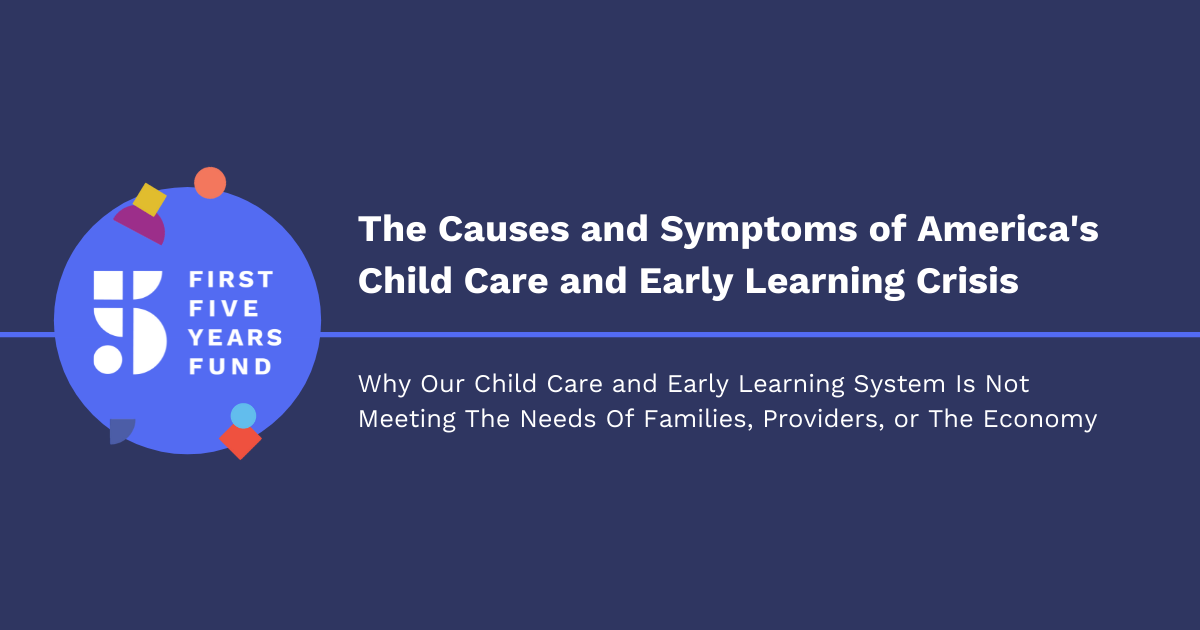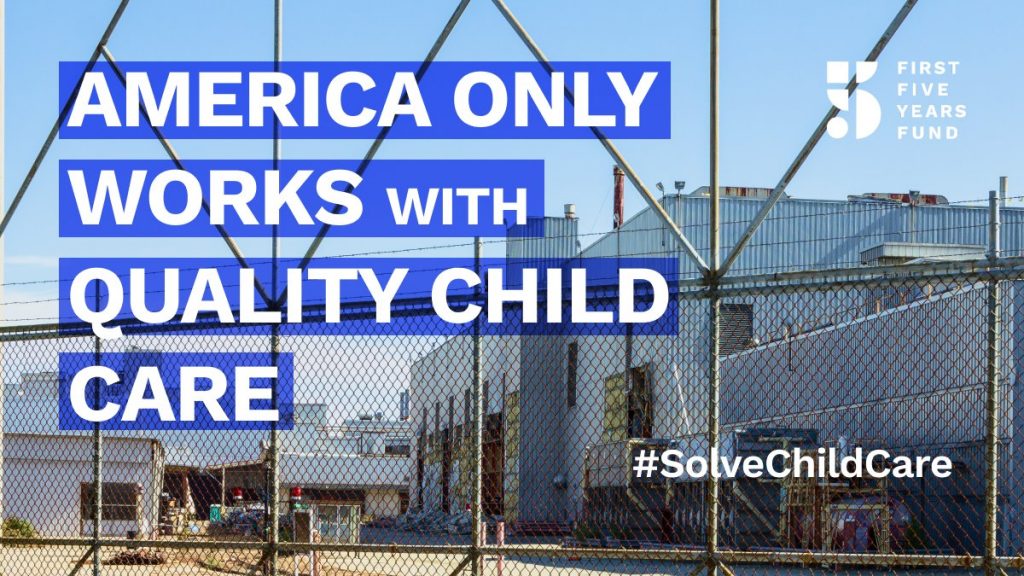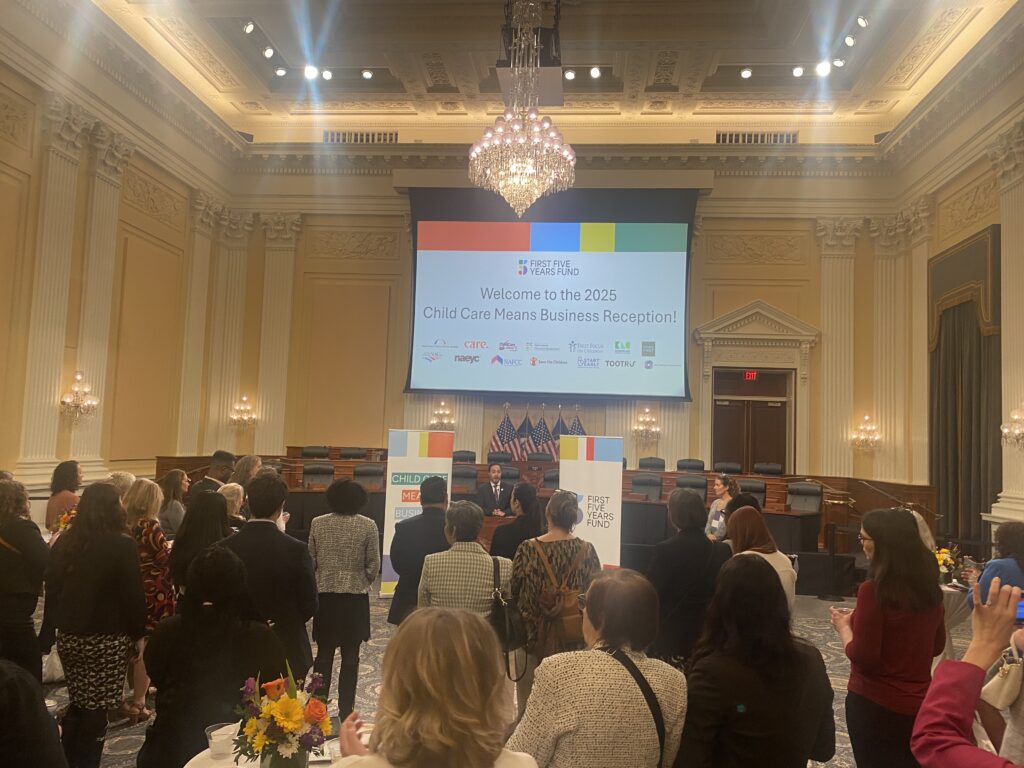FFYF Hosts Congressional Briefing on Our Current Child Care Crisis

On July 22, 2021, First Five Years Fund (FFYF) hosted a virtual congressional briefing, “Understanding the Child Care Crisis: Why Our Current Child Care System is Failing to Meet the Needs of Parents, Child Care Providers, and the Economy.” The briefing featured a panel of early learning and care experts, child care providers, and business leaders who spoke firsthand about the long-term challenges and shortcomings of the current system of early learning and care as well as the importance of access to quality and affordable child care for parents and our economy.
Panelist Linda Smith, Director of Early Childhood Initiatives, Bipartisan Policy Center (BPC) spoke about the challenges around availability, affordability, and sustainability within the child care system. Ms. Smith shared a map of the supply of child care across the country that highlighted that nearly 3.46 million children — approximately a 31% gap — do not have access to child care. She noted that “the economic impact of the gap alone is as high as $126 billion in terms of three factors: lost taxes, lost wages, and lost business revenue.”
Jerletha McDonald, Membership Director, National Association for Family Child Care (NAFCC) and former child care provider for over a decade spoke to the challenges she has observed in ensuring that the child care workforce is well supported and that enrollment numbers among children are able to remain stable. She also spoke about the financing challenges providers face, noting that providers “cannot financially plan our way out of market failure. Family child care providers cannot make better budget spreadsheets with revenue they don’t have… The biggest issue in child care is financing, and the lack of it.”
Dr. Elanna Yalow, Chief Academic Officer, KinderCare Education shared the perspective from a large national child care provider that employs approximately 30,000 educators serving approximately 130,000 young children in 40 states and Washington, DC. As nearly half of their families receive financial assistance through the Child Care & Development Block Grant (CCDBG), Dr. Yalow’s experience highlighted the importance of a strong federal investment in child care, including an increase in child care subsidies. She noted that for many of the families they served, the subsidies only covered a small portion of their child care costs.
Aaron Merchen, Director of Early Childhood Education Policy and Programs, U.S. Chamber of Commerce Foundation kicked off the final portion of the briefing by providing insight into the importance of child care access from the perspective of employers. He emphasized that a strong child care system is essential for our country’s workforce and business community, as 14 million parents in the workforce have young children. Additionally, he spoke to the fact that a strong child care system is critical to businesses as it ensures the retention of employees, increases productivity, and attracts new employees to the workforce.
Finally, Hugh Welsh, President and General Counsel, DSM North America; and Co-Chair, ReadyNation CEO Task Force on Early Childhood shared his experience as an executive of a large global corporation as they navigate a new work environment during the pandemic. He noted that while employees have many anxieties surrounding returning to work, the primary concern for his employees was accessing child care. “We’re very grateful that the government stepped in with emergency relief to help rescue the child care industry during the course of this pandemic, but that’s not enough. We really do need to see a greater investment [and] durable changes to policies and procedures.”He also reinforced some of the earlier comments made by other panelists about the economic impact of a lack of access to child care for families, noting that many parents “have trouble accessing child care, accessing affordable child care, have turned down promotions and opportunities in the past because of a lack of access to child care. These things are not sustainable if we want to continue to grow our economy.”

A link to the full briefing can be found here and the full list of panelists included:
- Linda Smith, Director of Early Childhood Initiatives, Bipartisan Policy Center (BPC)
- Alexandra Landeros, parent from Durham, North Carolina, MomsRising
- Carolina Reyes, Owner of the Arco Iris Bilingual Children’s Center in Prince George’s County, Maryland, National Association for the Education of Young Children (NAEYC)
- Jerletha McDonald, Membership Director, National Association for Family Child Care (NAFCC), former child care provider
- Dr. Elanna Yalow, Chief Academic Officer, KinderCare Education
- Aaron Merchen, Director of Early Childhood Education Policy and Programs, U.S. Chamber of Commerce Foundation
- Alexa Kramer, Director of Government Affairs, Grand Rapids (MI) Chamber of Commerce
- Hugh Welsh, President and General Counsel, DSM North America; Co-Chair, ReadyNation CEO Task Force on Early Childhood
You can find additional information and resources on how the federal government can better invest in a child care system that works here.
Subscribe to FFYF First Look
Every morning, FFYF reports on the latest child care & early learning news from across the country. Subscribe and take 5 minutes to know what's happening in early childhood education.



